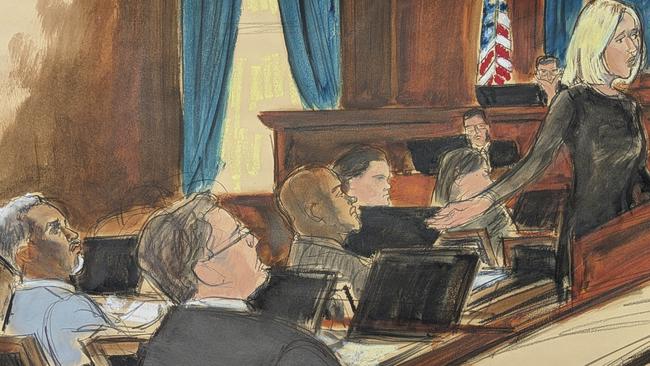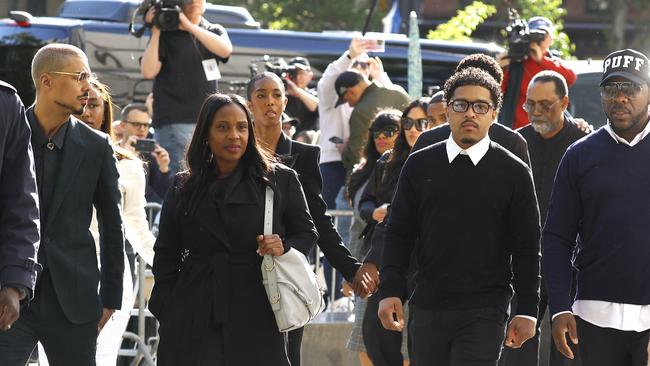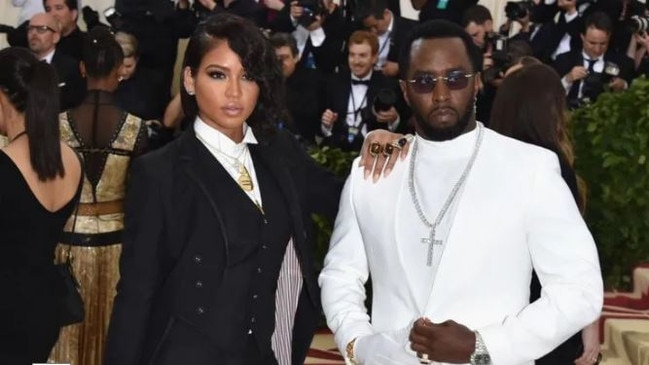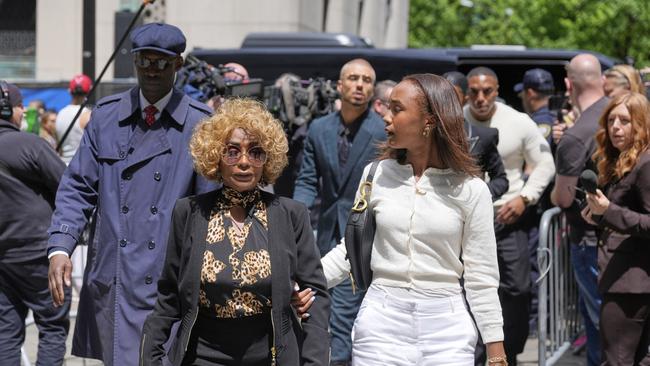Prosecutors say Sean ‘Diddy’ Combs ran criminal enterprise as trial begins
Long-awaited allegations against music mogul Sean ‘Diddy’ Combs have been outlined in court, as his lawyers claim he just lived a ‘swinger’ lifestyle.

Sean “Diddy” Combs used violence and threats of reputational ruin to control women he abused for years, New York jurors heard Monday during opening statements of the federal sex trafficking trial that was followed by the case’s initial graphic testimonies.
The panel of 12 jurors and six alternates responsible for determining Combs’s fate heard of the famed artist’s explosive outbursts and an attempt to preserve his own reputation and power of celebrity through bribery.
But the 55-year-old music mogul’s defence team insisted that while some of his behaviour was questionable – and at times constituted domestic abuse – it did not amount to evidence of the racketeering and sex trafficking he’s charged with.
Combs has pleaded not guilty on all counts, including the racketeering charge that the hip-hop pioneer led a sex crime ring that included drug-fuelled sex parties by use of force, threats and violence.
Prosecutor Emily Johnson alleged Combs “brutally” beat his former girlfriend, singer Casandra “Cassie” Ventura, threatening to release videos of her participating in elaborate sexual “freak-offs” if she defied him.
Ventura’s testimony is core to the case, and she is expected to take the witness stand as soon as Tuesday.
Johnson also told jurors Combs had set a man’s car ablaze and dangled a woman from a balcony, and made impossible demands of his lovers and employees alike.
“Let me be clear,” US attorney Johnson said, “this case is not about a celebrity’s private sexual preferences.” “It’s coercive and criminal.”
“He sometimes called himself the king,” she said. “And he expected to be treated like one.”
But Combs’s defence lawyer Teny Geragos told jurors the “case is about love, jealousy and infidelity and money.” Combs, appearing aged with his once jet-black hair now gray, dramatically stood up and looked at the jury box when Geragos introduced him, his hands clasped.
Geragos called Combs’s accusers “capable, strong adult women,” and said his situation with Ventura was a “toxic relationship” but “between two people who loved each other.” “Being a willing participant in your own sex life is not sex trafficking,” she said, adding that the defence would admit there was domestic violence – but that Combs is not charged with such crimes.
Combs was joined at the courthouse by his children, including 18-year-old twin daughters, as well as his mother Janice.
The case’s first witness was Israel Florez, a Los Angeles police officer who “at the time” was a security officer – and who responded to a call of “a woman in distress” on March 5, 2016 at the Los Angeles-area InterContinental Hotel.
Florez’s testimony provided the foundation for the prosecution to introduce evidence of now-infamous security footage – published by CNN last year – of Combs in a towel chasing Ventura throughout the hotel hallways, at times striking her.
The jury was repeatedly shown the video on Monday, including a cell phone-recorded version that Florez filmed himself of the original footage.
Florez said Combs had a “devilish stare” when the security guard arrived to the scene.
He added that he offered to call the police but didn’t because Ventura, who he described as having a “purple” eye, insisted multiple times she simply wanted to go.

Visibly tense but intensely alert, Combs watched as the security guard described the artist’s attempts to bribe him with a wad of bills to stay quiet over the incident at a Los Angeles hotel.
Florez detailed his interaction with Combs and Ventura in painstaking detail, including saying that after the officer escorted the rapper back to his room, Combs offered him a wad of cash.
The officer understood this was intended as a bribe: “He was telling me, ‘Don’t tell nobody,’” Florez said.
Florez’s testimony was followed by a male dancer, now 41, who engaged in a sexual relationship, often in exchange for money, with Combs and Ventura from 2012 to approximately the end of 2013.
In lurid detail, Daniel Phillip described his encounters with the pair, which generally involved sex with Ventura while Combs watched.
He said he first met Ventura and Combs in 2012, after he was called to perform at a bachelorette party.
He arrived at Manhattan’s Gramercy Hotel expecting to do a quick striptease for a group of partying women, he said.
But instead Ventura, wearing red lace lingerie paired with high heels, a red wig and dark sunglasses, answered the door.

Thus began Phillip’s relationship with the famous pair, an encounter that began with the dancer giving Ventura a massage with baby oil and ended with sex while a masked Combs watched in the corner.
Phillip would routinely receive payment from the couple anywhere from US$700 to $6,000, he told jurors.
Throughout Phillip’s at times intensely lurid testimony, members of Combs’s family, including his 18-year-old twin daughters, left the room.
Phillip said his enthusiasm for the relationship – which involved Combs directing sexual acts and sometimes filming them – waned after the first time he witnessed Combs strike and drag Ventura by the hair.
“I was shocked,” Phillip said. “It came out of nowhere. I was terrified.” Phillip said he urged Ventura to get out – but that she insisted she would be all right.
Why is she doing this, why is she staying with this guy?” Phillip recalled thinking.
“I tried to explain to her that she was in real danger if she stayed with him.”

After witnessing Combs’s abuse Phillip said he began to find it difficult to perform sexually in front of him.
Asked why he didn’t call the police, Phillip said that “this was someone with unlimited power.” Combs had already previously taken a photo of Phillip’s identification card “just for insurance,” the dancer said.
“I understood it to be he was threatening me,” he said.
Day one of testimony in the blockbuster trial saw hoards of journalists, influencers and members of the public descend on the downtown Manhattan courthouse.
If convicted, the one-time rap producer and global superstar, who is often credited for his role in bringing hip-hop into the mainstream, could spend the rest of his life in prison.
The selected jurors will remain anonymous, but not sequestered – meaning they must individually ensure they stay away from media coverage and social media commentary about the high-profile case.
The proceedings are expected to last eight to 10 weeks.
AFP



To join the conversation, please log in. Don't have an account? Register
Join the conversation, you are commenting as Logout